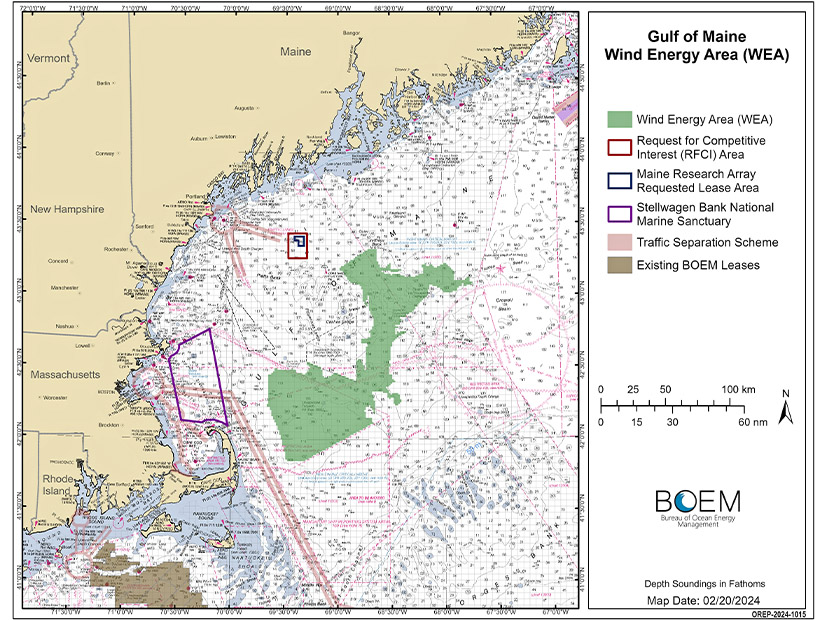
Federal regulators have finalized their proposed wind energy area (WEA) in the Gulf of Maine.
The zone has been trimmed, slashed and reshaped repeatedly since the U.S. Bureau of Ocean Energy Management began to gauge commercial interest in a 13.7-million-acre zone south of Maine.
After carveouts to avoid fishing and lobstering grounds, key wildlife habitats and cultural resources, the final WEA that BOEM announced March 15 totals approximately 2 million acres.
Even with the reductions, the area is believed to hold the potential for up to 32 GW of offshore wind development.
The WEA is 23 to 92 miles from land and stretches across water far too deep for wind turbines with fixed-bottom foundations, like those being built farther south along the New England coast.
Wind power development in the Gulf of Maine would rely instead on floating turbine technology that is being refined, including at the University of Maine. Maine hopes to be a leader in this new subsector and is separately pursuing BOEM approval of a research lease to place up to a dozen floating turbines closer to shore.
With the WEA finalized, BOEM will assess the potential environmental impacts of wind power development there and decide whether to proceed to leasing.
Multiple public comment periods have been opened so far, and more are yet to come. BOEM said this engagement has helped shape the WEA and will continue to be incorporated into the plans.
Maine’s governor and congressional delegation had pressed BOEM to remove a key lobster management area from the WEA. In a joint statement March 15, they said:
“We appreciate that the Bureau has heeded our concerns and the majority of the concerns of Maine’s fishing communities in its final designation of wind energy areas for the Gulf of Maine. This decision preserves vital fishing grounds and seeks to minimize potential environmental and ecological impacts to the Gulf of Maine. We look forward to reviewing the final map in detail and urge the Bureau to continue to engage with Maine’s fishing industry, coastal communities, tribal governments, and other key maritime users and stakeholders as the commercial leasing process moves forward.”
As indicated in their statement, not every stakeholder priority was entirely addressed.
The Maine Lobstermen’s Association told local media it appreciated some of the most important fishing areas being removed from the final WEA but said too many unanswered questions remained about the impact of wind power development in the Gulf of Maine.
New England for Offshore Wind said more efforts are in progress to avoid and minimize use of areas of historic and cultural significance to Maine’s tribal nations.
Maine Audubon said the announcement was an important step in the right direction, but it would pursue more wildlife safeguards.
But overall, many labor and environmental advocacy groups were pleased with the WEA.
“Maine is setting an example for the rest of the nation for responsibly developing offshore wind, balancing the needs of coastal communities and wildlife protection with the urgency to address climate change — the greatest threat facing our woods, waters, trails and coastlines,” said Jack Shapiro of the Natural Resources Council of Maine.
“BOEM’s announcement today reflects a major step forward for responsible and equitable offshore wind development in the Gulf of Maine,” said Kelt Wilska of New England for Offshore Wind. “New England is once again setting a national model for reducing potential conflicts during project construction and respecting the critical role that heritage fishing industries play in our economy.”



